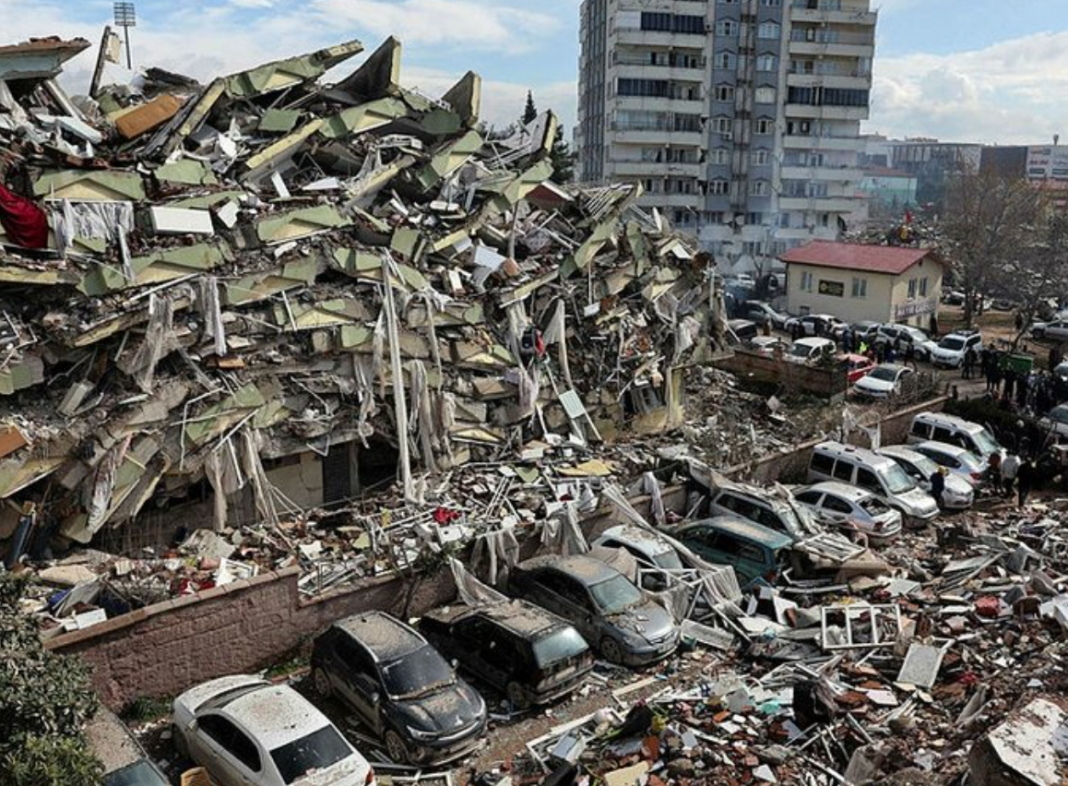Adnan R. Khan analyzes impacts of the earthquake in Turkey in The Globe and Mail on February 9, 2023.
The scenes of destruction from Turkey’s southeast are almost incomprehensible. Entire streets have been transformed into post-apocalyptic heaps of rubble; groups of people are huddled around the eerie red glow from burning oil drums, trying to keep warm. Most have lost everything in their flattened homes, lucky just to be alive after the worst earthquake to hit this part of the world in a century.
The numbers are staggering: more than 19,000 dead, the vast majority in Turkey, with the toll expected to continue to rise as the massive piles of shattered concrete and twisted steel are cleared. In parts of the city of Kahramanmaras – the epi centre of the first earthquake, which had a magnitude of 7.8 – emergency crews have already stopped calling their efforts a rescue mission; they are now just recovering the dead.
It’s tempting to think that such a massive natural disaster kills indiscriminately – that the rich, the poor, the powerful and the powerless all suffer. But the reality is that this disaster, like so many before it, disproportionately affected poor people – and evidence is emerging that shoddy construction and inequality contributed to the tragedy.
“This was not supposed to happen,” Erdem Canbay, the chair of the department of civil engineering at the Middle East Technical University in Ankara, told me by telephone from Hatay, one of the worst-hit areas. “Newly constructed buildings were supposed to be able to withstand this kind of event. But I’m seeing new buildings in a state of total collapse. This indicates to me that they haven’t been built properly.”
The evidence of structural failure appears obvious from images of high-rise buildings that have fallen straight downward in a “pancake collapse”; I’ve seen this kind of devastation before, in Pakistan after the 2005 Kashmir earthquake. There, too, poor construction was the culprit. Structural engineers from Canada’s Disaster Assistance Response Team told me then that these kinds of collapses – which leave few survivors, for obvious reasons – occur when there’s an insufficient bond between the walls and the ceilings, or when low-quality materials are used.
As the death toll mounts, anger is rising, too. Turkish authorities have gone into damage control, briefly blocking Twitter after videos began to emerge of people complaining about the government’s spotty response; access was restored only after outcry from emergency crews, who were using the platform to co-ordinate rescue efforts. Mr. Canbay says he regrets having to conduct his investigation of collapsed buildings even as bodies are being pulled from them, but he is worried that Prime Minister Recep Tayyip Erdogan’s AK Party government will work to quickly wipe away any evidence of its negligence.
The government’s eagerness to control the narrative can be explained by the ways in which it has championed the country’s construction sector as its golden goose over the AK Party’s 21 years in power, not just in Turkey, but throughout the Middle East. It cannot afford to have the sector’s reputation tarnished.
But trust has been on the decline for years. When the AK Party took power in 2001, it promised to modernize Turkey’s infrastructure, launching a massive project to make the country’s buildings earthquake-proof; in 2018, it updated standards around structures in earthquake-prone regions. It even instituted a tax that was meant to pay for the upgrades. Turks are now asking where all that money went.
And ever since the 1960s, and most recently from 2018 to 2019, the Turkish government allowed property owners to pay a fee to receive an amnesty for unregistered construction work and projects without necessary safety certificates. The amnesty raked in billions of dollars for the government at a time when the Turkish economy was in freefall – but its Chamber of Civil Engineers ominously predicted at the time that it would turn Turkey into a “graveyard” if a major earthquake occurred.
Even then, Turkish engineers acknowledged that wealthy neighbourhoods were receiving the engineering attention they deserved, since the wealthy had the means to investigate a construction company’s bona fides and demand quality construction. Most of the buildings that most recently received amnesty were low-cost housing owned by the middle class and the poor – many of the same kinds of buildings that bore the brunt of damage during this earthquake.
“We should have had almost zero deaths in new buildings if the construction was done properly,” Mr. Canbay lamented. “We need a proper investigation, and action against those responsible.”
But with Mr. Erdogan declaring a three-month state of emergency in the disaster zone, with a clear willingness to lock down information flows, it’s unlikely that will happen.
The Globe and Mail on February 9, 2023 by Adnan R. Khan.
Adnan R. Khan is an Istanbul-based independent writer and photographer who has covered migration and refugee issues for the past decade.

